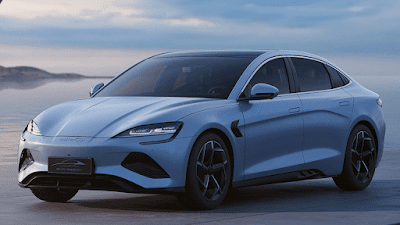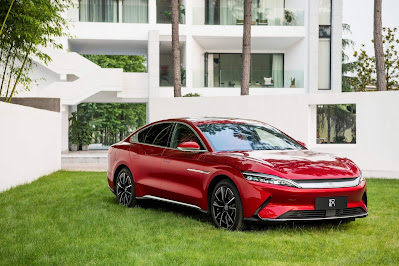BYD Auto (BYDDF) is the fourth largest plug-in electric vehicle (BEV and PHEV) company and fourth largest BEV company in the world, with 9.1% and 7% global market share respectively in 2021.
The company has mainly based its sales in Mainland China, but is undertaking rapid expansion into the global market, with sales hitting over 100,000 per month in March 2022, and is expecting to sell between 1.5 million to 2 million plug-in EVs in 2022, around 3 to 4 times the volume in 2021, possibly overtaking current world leader Tesla.
May 2024: The Tesla archrival BYD launched cheap, new hybrid electric vehicles capable of traveling 1,300 miles without recharging or refueling — opening a new front in the EV wars.
- Sector(s): Consumer Cyclical
- Industry: Auto Manufacturers
- Local EV rivals: XPeng, Li Auto and Nio
- Full Time Employees: 224,280
- Founded in 1995
- headquartered in Shenzhen, China
- https://www.byd.com
BYD, the largest seller of EVs in China and the world's largest seller of EVs and plug-in hybrids, aims to sell four million vehicles in 2023, at least doubling this year's estimated total.
Warren Buffett's Berkshire Hathaway (BRKB) is a longtime investor.
Like Nio and Xpeng, BYD began selling EVs in Norway in late 2021, starting with the Tang SUV.
Notably, BYD is profitable, in sharp contrast to Li Auto, Nio and Xpeng Motors, though capital spending surged in 2021 to power the company's ongoing expansion.
Majority of its EVs and hybrids selling for $15,000-$34,000, though some vehicles top $40,000.
It's possible that BYD's EV-only sales will top Tesla sales by year-end. BYD's sales are far above those of Nio, Li Auto and Xpeng, let alone U.S. EV startups Lucid and Rivian Automotive.
On April 3, BYD reported that March sales of new energy vehicles hit 104,878, up 333% vs. a year earlier and 88,283 in February.
The March total includes 104,338 passenger cars, virtually all in China. Of that, BYD sold 53,664 pure electric vehicles, up 229% from a year earlier. Plug-in hybrid sales skyrocketed 615% to 50,674.
BYD's hybrid sales have skyrocketed thanks to a new DM-i system that provides substantial battery range.
For the quarter, BYD sold 286,329 EV and hybrid vehicles. That is nearly equal to Tesla's all-electric deliveries.
BYD also is adding significant EV capacity.
The auto giant has signaled that it will conservatively sell 1.5 million new energy vehicles in 2022, or up to 2 million if supply issues ease. That's up from 2021's NEV sales of 593,745.
BYD has opened or will open three new factories in early 2022, boosting annual capacity by 500,000 vehicles. Local media reported that a new factory in Jiangxi province was set to begin mass production on April 15.
BYD EVs Big And Small
BYD has a slew of models, some with electric and hybrid versions such as the flagship BYD Han sedan. The automaker is rolling out several new EV and hybrid models in the next several months, along with notable revamps or longer ranges for key models.
Yuan Plus
BYD began China sales of the Yuan Plus in February, with a subsidized price starting below $21,000. The all-electric Yuan Plus has a range of 267 miles-317 miles under a very loose China standard. The compact SUV is BYD's second Ocean line EV using its e-platform 3.0, following the smaller Dolphin. The Yuan Plus also is kicking off an expansion into new export markets, notably Australia. The compact SUV has begun presales in Australia as the Atto 3. The Yuan Plus also will enter the Singapore market.
BYD Dolphin
BYD Seal
Among BYD's upcoming models is the Seal sedan. The Seal will be a Model 3 rival, but significantly cheaper. Unlike many Tesla rivals, when BYD launches a new model, it quickly produces in volume.
May 2024: BYD showed off its new Qin L and Seal 06 cars — both equipped with its latest hybrid tech and priced from under RMB 99,800 ($14,000).
BYD Han
BYD on April 10 officially launched more-advanced hybrid versions of its BYD Han, with an electric-only range of up to 150 miles on a China standard. The flagship BYD Han already comes in all-electric and an older hybrid form. The all-electric Han also got a substantial upgrade, including a big increase in battery range. BYD said on April 10 that it received more than 48,000 order for the updated Han EV and hybrid models, which have been available for preorder since March 19.
BYD Tang
BYD has sold the Tang in Norway since late 2021, but will sell the SUV and two other electric vehicles across much of Europe starting in the fourth quarter. (Business Wire). The Han and Tang begin at 72,000 euros.
BYD has sold the Tang in Norway since late 2021, but will sell the SUV and two other electric vehicles across much of Europe starting in the fourth quarter. (Business Wire). The Han and Tang begin at 72,000 euros.
BYD also is one of the biggest makers of electric buses, with plants in the U.S. and many other countries besides China. In late January, BYD unveiled a new, smaller school bus for the U.S. market with bus-to-grid charging abilities.
BYD has gotten a slew of bus orders recently in Europe, where diesel buses are being phased out. That could serve as a steppingstone for BYD's personal EV ambitions on the Continent.
BYD also makes EV delivery trucks, big rigs, garbage trucks and more. Anheuser Busch recently added an additional 20 BYD electric trucks to its California fleet. BYD signed a deal to deliver 200 Class 8 electric trucks in the U.S. for Sweden's Einride.
BYD makes buses, big rigs and other heavy vehicles for the U.S. market at its Lancaster, Calif., plant. Also at Lancaster, BYD will assemble the next generation of Nuro self-driving delivery vehicles, using many BYD parts, including Blade batteries.
Foreign sales: 40% of revenue comes from the international market
BYD's auto plants are in China, with virtually all its sales there. BYD easily tops Tesla in local China sales, even just in EVs.
Another upside is that BYD has a lot of markets to expand into. In late 2021 it began selling the Tang SUV in Norway, giving it a foothold for a much-larger expansion across Europe.
It is shipping various EVs and hybrids to Latin America, launching its BYD Han in Brazil.
BYD officially launched Yuan Plus presales in Australia, branded as the Atto 3 for the local market, on Feb. 19. Atto 3 deliveries are set to begin in July. BYD's Dolphin and Seal will enter the Australian market, perhaps with the Atto 2 and Atto 4 names, BYD's importer says. The Dolphin could launch by year-end, with the Seal in Q2 2023.
BYD's low to moderately priced vehicles could serve rich and developing nations, while Tesla's current and planned vehicles are clearly aimed at affluent customers in rich nations. But America isn't in BYD's sights for now. Tariffs on China-made autos make exports to the U.S. cost prohibitive.









No comments:
Post a Comment